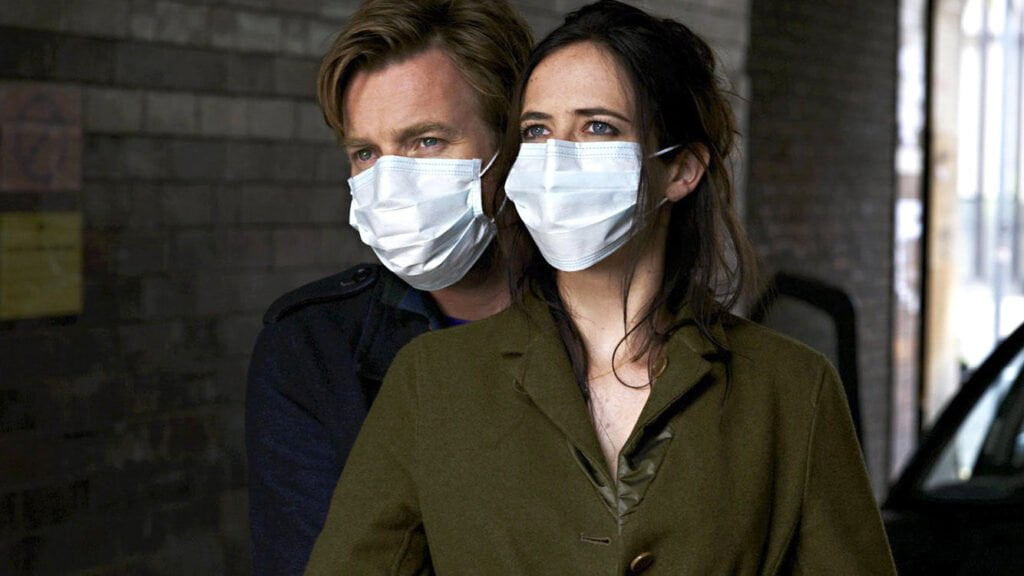On the surface, and judging by the posters, Perfect Sense is just a steamy romantic drama tinged with light science fiction. The bare-chested woman in the first scene doesn’t help with breaking the expectations. (At least there’s equal-opportunity nudity later on, though.) Furthermore, Perfect Sense is not a conventional horror movie in any sense. The blood is minimal, there is no supernatural Big Bad antagonist, and the score lacks sharp strings and heavy bass. Instead, the horror comes from the concept of the film. An epidemic is swiftly stripping humans of their senses, one at a time. “They don’t even have time to give the disease a name,” says Susan, one of our protagonists. In a world where we lose our abilities to experience any and everything, what remains?
I suppose we should start with what the movie promises. The posters look like those of your typical romantic drama: a man, Ewan McGregor, and a woman, Eva Green, about to kiss. The tagline on one simply says, “A Modern Love Story,” and another reads, “Without love, there is nothing.” Gee, that’s helpful. Meanwhile, the trailer shows kissing, laughing, yelling, and crying. Neither McGregor nor Green are strangers to intimate scenes, so it’s expected that we’ll see some canoodling. Part of what I appreciate about this film is that the sex isn’t shameful or voyeuristic. It’s a means of genuine connection. Again, nothing special, but it certainly doesn’t seem like anything to classify the film as horror.
Very early on, however, we learn of an epidemic in the UK involving the loss of smell. There is no pattern, no connection between symptomatic people, and no indicators of what the disease or virus looks like. The doctors and scientists only know that it is spreading. The epidemic quickly becomes a pandemic – so quickly, in fact, that “They don’t even have time to give the disease a name.” Green’s character, Susan, is an epidemiologist, which gives us insight into what is known, or more accurately, all that we don’t know. What starts as a sense of creeping dread turns into feelings of futility, hopelessness, and, yes, horror.
Before each sense is lost, there is an outburst of emotion. The first three losses come with grief, panic, and anger, respectively. The scene after the panic is, for lack of a better word, gross. The emotion is followed by an all-consuming hunger. But wait! It gets worse. The scenes accompanying anger and its consequences are outright scary. We see brutality, fire, blood, violence, and all its effects. The peaks of emotion reached by the characters are out of place in a typical romantic drama. They are more than screaming and sobbing. They depict overpowering, out-of-control fractures in the psyche. Most threats in the horror genre rely on the loss of power and control, so Perfect Sense really isn’t too far removed.
The movie is perhaps made even more unsettling by our current global situation. There are people wearing masks. Once-hectic restaurants are barren. Many people are quarantining while others deny the truth and laugh it off. Religious zealots claim it is all part of some higher plan, some question if it’s biological warfare, and conspiracy theorists act as you could very well predict. Scenes from across the globe show how various cultures deal with the threat. The parallels to COVID made my viewing experience hit closer to home than when I first watched it several years ago.
Perfect Sense as a whole is profoundly upsetting. It shows what we take for granted and the grim reality that we all eventually face: we are alone and will die as such. A repeated line is “Life goes on.” Depending on the situation, it’s either gut-wrenchingly depressing or slightly hopeful. Either way, there is a sense of futility. Life goes on regardless of our presence. The horror in the film is more cosmic and existential than your usual scary offerings. Since I love deeper, more speculative horrors, and Perfect Sense provides exactly that, I highly recommend watching it for those with similar tastes.
